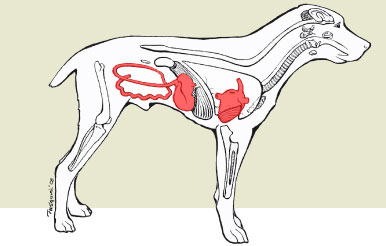Table of Contents
Symptoms | Diagnosis | Treatment | Home Remedy | Prevention
Summary:
"Parvo in puppies (CPV) has no cure. Treatment is focused on reducing symptoms. Given the potential severity of the disease your puppy should be examined by a veterinarian immediately. Consult your veterinarian about conventional treatments for dehydration, diarrhea and natural supplements designed to help with Parvo. Because of the severity of this disease, puppies and young dogs should not be exposed to other dogs in public places until vaccinated."
Overview
Parvo is a serious virus that occurs more often in puppies than in older dogs because their immune systems are not as strong. Parvo is highly contagious. It is shed in the feces of infected dogs, but it can live on objects such as toys, bedding, and cage floors for up to six months.
Your dog should be vaccinated for parvo as a puppy and receive yearly vaccines after that. Vaccination is very important, because there is a high mortality rate with parvo.

Source: Cornell University College of Veterinary Medicine
Parvo in Puppies Symptoms
Parvo virus attacks a dog's digestive system. Parvo in puppies symptoms usually start with a high fever, lethargy, and a lack of appetite. Next comes vomiting and severe diarrhea. Diarrhea is often yellow in color, bloody, and very foul smelling. Dehydration, shock, and death can occur.
The virus can also attack a dog's heart, causing congestive heart failure. This can happen months or even years after an apparent recovery from the intestinal form of the disease.
Parvo in Puppies Diagnosis
If your puppy has symptoms of parvo virus, he should see a vet right away. If he is having diarrhea, take a stool sample with you. Your vet can test the stool for the parvo virus. Low white blood cell counts are also an indicator of the CPV (canine parvovirus) since the disease infects the bone marrow.
Parvo in Puppies Treatment
There is no cure for parvo in puppies. Treatment is aimed at the various symptoms.
Dehydration is a big concern due to the severe vomiting and diarrhea. Subcutaneous (under the skin) or intravenous fluids are often required. Medications to stop vomiting and diarrhea are often administered. If your dog is vomiting, your vet may instruct you to withhold food, but fresh water should be kept available to him.
Antibiotics will not cure the parvo virus, but they may be prescribed because secondary bacterial infections often set in while the puppy's immune system is compromised. A broad spectrum de-worming agent may be prescribed, as well.
You will need to disinfect your puppy's toys, cage, and other items that he uses regularly so that he does not become reinfected. Use half a cup of bleach to a gallon of water, and wash all items thoroughly.
Your puppy will still be contagious for at least two months, so he should be kept away from other dogs. People and cats cannot get parvo, so it is safe for your puppy to be around them. Ask your vet when it is safe for him to be around other dogs.
Home Remedy for Puppy Parvo
While there is no cure for parvo, there are homeopathic products that could help with the disease or used in conjunction with other treatment options recommended by your veterinarian. Specifically,
* Arsen alb.(6C): for digestion problems and upsets such as cramping, vomiting and diarrhea. Helps dogs with signs of lethargy and irritability.
* Verat. alb.(6C): for strong vomiting, cramps and diarrhea. This remedy is particularly useful for dogs with fever and dehydration which are both symptoms of Parvovirus.
* Belladonna (30C): for relief from acute fever, pain, inflammation.
* Parvo (30C): Contains homeopathic nosodes made from materials similar to the parvovirus vaccine. As an alternative to or supplement to a parvo vaccine it works the same way to build protection and resistance against the disease. Research has shown a high rate of success in the treatment and prevention of Canine Parvovirus using this homeopathic 'vaccine'.
* Zingiber officinale (Ginger): Works in the digestive tract, Zingiber boosts digestive fluids and neutralizes acids, making it an effective alternative to conventional anti-nausea medication. Research studies have validated its use in relieving the symptoms of nausea, vomiting, indigestion and flatulence. * Agrimonia eupatoria (Agrimony): relieves diarrhea and reduces inflammation of the mucus membranes and soothes restless dogs. Used in the treatment of digestive disease including colitis, appendicitis and diarrhea.
A good safe source worth trying that combines these supplements is Parvo-K.
Parvo in Puppies Prevention
Puppy parvovirus (CPV) prevention starts with vaccination. The vaccine is combines with vaccines for coronavirus and distemper. Vaccinations are provided every 3 to 4 weeks starting when a puppy is 6 weeks old until 16 weeks old.
Prior to the completion of vaccination, do not bring your puppy outdoors, as just about every surface should be considered to be holding the virus.
If you believe your home has been contaminated, bleach is one of the few household products that can kill the virus on surfaces (used 30 parts water to one part bleach). For the brief periods where you do bring a puppy outdoors, wash down any surfaces to dilute any existing virus.
For More Information on Parvo in Puppies
There is a FREE book available on parvo worth reading. It is offered by a company that specializes in homeopathic parvo treatment. You can get the book by clicking on this link: What is Parvo and what can you do about it?
References
Canine Parvo Virus and Distemper
Lobetti, Remo
